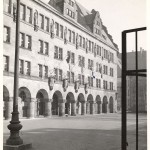On August 8, 1945, representatives of the United Kingdom, United States, provisional government of France and the Union of Soviet Socialist Republics signed the Agreement and Charter establishing the International Military Tribunal for the prosecution and punishment of the major War Criminals, known as the London Charter. The result of long and difficult negotiations that began while the Allied forces pushed in on the German lines from both east and west, the London Charter was concluded almost three months to the day that Germany surrendered to the Soviet Union.
The charter of the International Military Tribunal (IMT) declared that aggressive war was an international crime and established the IMT court in Nuremberg, Germany to try the remaining major German leaders for their actions both before and during World War II. Nuremberg was notorious as the city where Hitler had proclaimed his racial laws in 1935. Four judges from the United States, Great Britain, France, and the Soviet Union, as well as alternates for each, were assigned the jurisdiction to try high ranking German government, military, and civilian leaders deemed personally responsible for the specific crimes. This would be the first time that an international court would hold a government responsible for its treatment of both its own citizens and citizens of other countries during war time.
The wrongs which we seek to condemn and punish have been so calculated, so malignant and so devastating that civilization cannot tolerate their being ignored because it cannot survive their being repeated. [Justice Robert Jackson, opening statement People vs. Nazism]
The specific charges that were brought against twenty-three individuals included crimes against peace, war crimes, and crimes against humanity. Crimes against peace were defined as the planning, preparation, initiation, and waging of a war of aggression. War crimes were defined as the violations of the laws or customs of war including the murder, ill treatment and deportation to slave labor of civilian populations and the murder and ill treatment of prisoners of war. Crimes against humanity were defined as the murder, extermination, enslavement, deportation and other inhumane treatment of civilians before and during the war. This also included the persecution of individuals on political, racial or religious grounds.
The founders of the Nazi party were charged with conspiring to launch World War II and related atrocities from 1919 to 1945. All of the defendants were charged with planning aggressive war. Eighteen defendants were charged with war crimes and crimes against humanity. Seven Nazi organizations were accused of these crimes. If convicted, all of the thousands of members of those organizations would have been considered guilty without the benefit of a trial.
This blog will follow the events and individuals of the trials in Nuremberg from its establishment in the summer of 1945 through the delivery of verdicts in October 1946, illustrated with documents and images from the papers of Thomas J. Dodd, executive trial counsel for the U.S. The series will also include entries from multiple guests—recognized scholars commenting on the impact, significance and present day results of the International Military Tribunal (Nuremberg).
Additional information can be found in the Thomas J. Dodd Papers:
http://doddcenter.uconn.edu/asc/findaids/Dodd_Thomas/MSS19940065.html
Related documents:
Report of Justice Robert Jackson http://www.loc.gov/rr/frd/Military_Law/pdf/jackson-rpt-military-trials.pdf
Statement by Justice Jackson on War Trials Agreement; August 12, 1945 http://avalon.law.yale.edu/imt/imt_jack02.asp
Contact Betsy Pittman (betsy.pittman@uconn.edu), University Archivist, with any questions about the collections or references.

